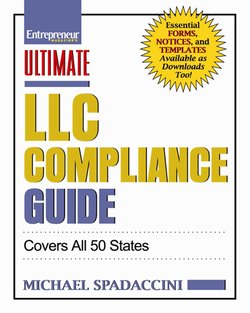Читать книгу Ultimate LLC Compliance Guide - Michael Spadaccini - Страница 15
На сайте Литреса книга снята с продажи.
LIMITED LIABILITY COMPANY ACTS
ОглавлениеEvery state has a limited liability company act and there are many similarities from state to state, but there is no uniform law in effect in all states. When you organize an LLC in a particular state, you agree to comply with its limited liability company act and it is presumed that you know its requirements. If there is a conflict between the state statute and your articles or operating agreement, the statute will prevail.
▼ Good to Know
There is no federal corporation law or federal LLC law. The federal government has chosen to stay out of the corporation law arena. Thus, it is not possible to charter an LLC in the United States: all U.S. corporations are chartered within one of the 50 states or other jurisdictions, such as the District of Columbia. The United States differs in this respect from some other nations, which charter their corporations at the national level.
The Uniform Limited Liability Company Act (ULLCA), drafted by the National Conference of Commissioners on Uniform State Laws in 1996 and revised in 2006, has been adopted by a few states. The ULLCA reflects the modern trend in business laws and it represents the subjects commonly found in all state LLC statutes.
Therefore, to help you better understand limited liability company act requirements and to guide this chapter’s discussion, the ULLCA will serve as a model of a typical limited liability company act.
Before jumping into this discussion, two concepts should be explained.
The first is the concept of sources of authority. An LLC is a creature of statute and can only do what state laws permit it to do. All states have some written LLC laws and all states’ LLC laws provide a general outline of what LLCs can and cannot do. The laws often defer to an LLC’s articles of organization or operating agreement to fill in the gaps. As a result, the LLC laws and an LLC’s articles of organization and operating agreement provide the sources of authority that control what an LLC can do and how it must act.
The second concept is the distinction between a statute and an act. Both terms refer to laws duly adopted by Congress or by a state legislature. All the laws adopted by Congress or a state legislature are statutes. Some of these statutes may empower an administrative agency like the Internal Revenue Service to pass rules to implement the statute. A specific body of statutes is an act. For example, in most states, all the statutes that pertain to LLCs are found together in the limited liability company act. Acts are sometimes referred to as codes, including the Internal Revenue Code, Uniform Commercial Code, or a criminal code.
